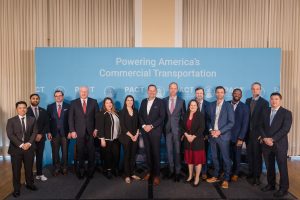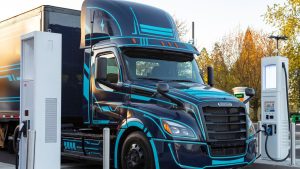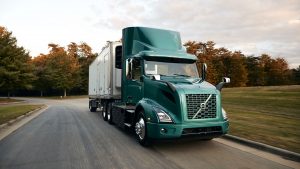- Discover how leading truck manufacturers are revolutionizing the commercial transportation sector with the EV Charging Infrastructure Initiative, setting a new course for sustainable logistics.
- Unveil the groundbreaking coalition, PACT, spearheading the charge towards a zero-emission future by tackling the pressing challenges of medium and heavy-duty vehicle electrification.
- Explore the ambitious goals and collaborative efforts poised to deploy nearly 700,000 chargers by 2030, powering America’s transition to electric transportation.
EV Charging Infrastructure Initiative: A Strategic Move Towards Sustainable Commercial Transportation
Introduction to the Initiative

PACT: A coalition driving the zero-emission revolution in commercial transportation, one charger at a time.
In a landmark collaboration aimed at transforming America’s roadways and freight systems, the EV Charging Infrastructure Initiative marks a pivotal step toward the future of zero-emission commercial transportation. Daimler Truck North America, Navistar, and Volvo Group North America have set the stage for “Powering America’s Commercial Transportation (PACT),” a strategic coalition poised to reshape the industry. This initiative seeks to catalyze the development of a nationwide charging infrastructure for medium and heavy-duty zero-emission vehicles (ZEVs), addressing one of the most significant barriers to the widespread adoption of sustainable transportation solutions. For insights on the growing importance of electric vehicles in the transportation sector, explore this link.
The PACT Coalition: Uniting for a Electric Future
Overcoming Infrastructure Barriers
The Challenge of Charging Infrastructure

Pioneering a sustainable future with the launch of the EV Charging Infrastructure Initiative—a leap towards eco-friendly logistics.
With the goal of decarbonizing the commercial transportation sector, PACT aims to bridge the gap between current infrastructure capabilities and the needs of zero-emission fleets. The coalition’s formation is a response to the urgent need for accessible and reliable charging stations, capable of supporting the operational demands of medium and heavy-duty electric vehicles. As the transportation electrification efforts in the U.S. have predominantly focused on light-duty passenger vehicles, PACT underscores the necessity for a dedicated approach to commercial fleet electrification. Dive deeper into the challenges and solutions for developing robust EV infrastructure, follow this link. Learn more about the advancements in charging stations and how they’re shaping the future of electric trucks, check out this page.
Membership and Collaboration

Uniting for a greener tomorrow: How collaboration accelerates the journey towards zero-emission commercial fleets.
PACT’s inclusive strategy invites participation from a wide array of stakeholders, emphasizing the coalition’s role as a platform for cross-sector collaboration. This approach facilitates the pooling of resources, expertise, and influence, critical for overcoming the complex challenges associated with infrastructure development. By uniting manufacturers, infrastructure developers, electric utilities, grid operators, and more, PACT leverages collective strength to accelerate progress towards a sustainable transportation future. For additional insights into the role of stakeholders in the EV industry’s growth, explore this page.
Enjoying our insights?
Subscribe to our newsletter to keep up with the latest industry trends and developments.
Stay InformedThe Significance of Zero-Emission Commercial Vehicles
A Paradigm Shift in Transportation Electrification
PACT’s efforts to promote commercial transportation electrification are informed by the unique considerations of the sector, including the need for significant capital investment, electrical grid upgrades, and specialized charging equipment. Addressing these challenges is crucial for the rapid and efficient deployment of charging infrastructure, capable of supporting the nation’s commercial fleet. The initiative’s focus on medium and heavy-duty vehicles highlights the critical role these fleets play in achieving national climate goals, underscoring the importance of transitioning to zero-emission alternatives. Stay updated on the latest trends in zero-emissions technologies and their impact on the environment, click here.
The Numbers Speak: The Demand for Chargers

Nearly 700,000 chargers by 2030—fueling America’s shift to electric transportation and beyond.
With projections indicating that nearly 700,000 chargers will be required to support an anticipated fleet of 1 million Class 4-8 medium and heavy-duty ZEVs by 2030, the scale of infrastructure development needed is unprecedented. This demand presents a significant challenge, not only in terms of the sheer number of charging stations but also in the capacity of the electrical grid to support such an extensive network. PACT’s mission is to address these challenges head-on, ensuring that the necessary infrastructure is in place to facilitate the widescale adoption of zero-emission commercial vehicles.
Voices from the Coalition
The Leadership’s Perspective
- Daimler Truck North America: John O’Leary, President, and CEO, emphasizes the coalition’s role in overcoming the infrastructural and regulatory barriers that currently hinder the adoption of zero-emission technologies in the commercial transportation sector. Through PACT, Daimler aims to drive the necessary changes to ensure a sustainable future for commercial transportation.
- Navistar: Mathias Carlbaum, President, and CEO, highlights the importance of providing fast, reliable, affordable, and convenient power solutions for commercial vehicle customers. Navistar’s commitment to PACT reflects its dedication to enabling the success of zero-emission fleets through collaborative efforts.
- Volvo Group North America: Stephen Roy, Chairman, and President of Mack Trucks, discusses the challenges associated with deploying the infrastructure needed for medium- and heavy-duty EV adoption. Volvo’s involvement in PACT underlines the company’s commitment to promoting best practices and minimizing the impact on fleets, utilities, and the economy.
For more news and updates on how companies like DTNA, Navistar, and Volvo Group are contributing to the EV landscape, check out this link for DTNA, this one for Navistar, and another here for Volvo Group.
The Road Ahead: Challenges and Opportunities

Empowering the commercial fleet of the future with reliable and accessible charging solutions.
As the EV Charging Infrastructure Initiative moves forward, it faces both challenges and opportunities. The need for extensive capital investment, grid upgrades, and the development of dedicated charging solutions are among the hurdles to be overcome. However, PACT’s collaborative approach and commitment to education and policy advocacy provide a clear path toward addressing these issues and advancing the deployment of zero-emission commercial vehicles. To understand the strategic developments in the freight industry as it moves toward electrification, visit this link.
PACT’s Commitment to a Sustainable Future
In championing practical and efficient infrastructure solutions, PACT remains focused on facilitating a smooth transition to electric transportation. By prioritizing the development of a robust charging infrastructure, the coalition plays a crucial role in ensuring that the commercial transportation sector can achieve its electrification goals, making a significant contribution to national and global environmental objectives. Explore our news on factors influencing growth in sustainable transportation across the industry, explore this link.

Navigating the road ahead: The strategic moves shaping the future of America’s commercial transportation.
The EV Charging Infrastructure Initiative represents a critical step forward in the effort to decarbonize commercial transportation in the United States. By addressing the significant challenges related to charging infrastructure, the initiative not only supports the adoption of zero-emission vehicles but also contributes to the broader goal of creating a sustainable and environmentally friendly transportation sector. As this ambitious project moves forward, it holds the promise of transforming the landscape of commercial transportation, making electric trucks a common sight on America’s roads.
Key Developments in Accelerating Commercial Transportation Electrification
Empowering America’s Electric Transportation Revolution
- Formation of PACT: A strategic alliance between Daimler Truck North America, Navistar, and Volvo Group North America, aiming to overcome infrastructural hurdles and pave the way for widespread adoption of zero-emission vehicles.
- Unprecedented Infrastructure Needs: The initiative’s response to the International Council on Clean Transportation’s forecast, highlighting the requirement for nearly 700,000 chargers to support the future fleet of electric trucks.
- Collaborative Stakeholder Engagement: PACT’s inclusive approach, inviting OEMs, infrastructure developers, and utility operators, among others, to join forces in this monumental effort towards sustainable commercial mobility.
- Strategic Policy Advocacy: Dedicated efforts to shape state and national policies, ensuring the seamless and efficient rollout of the necessary charging infrastructure to meet the sector’s electrification targets.
- Technological Innovation and Awareness Campaigns: Focused on introducing cutting-edge charging technologies and raising awareness about zero-emission vehicles’ benefits.
These pivotal developments underscore the collaborative and strategic efforts underpining the EV Charging Infrastructure Initiative, marking a significant step forward in the quest for sustainable commercial transportation solutions.
PACT Embraces U.S. Zero-Emission Freight Corridor Strategy
The recent statement by Powering America’s Commercial Transportation (PACT) on the Biden-Harris Administration’s National Zero-Emission Corridor Strategy reveals significant support for electrifying the nation’s freight-hauling system by 2040. PACT appreciates the all-government and market-driven approach to creating accessible and reliable ZEV infrastructure. This strategy, developed with various departments and agencies, aims to align investments and planning for medium- and heavy-duty ZEV infrastructure until 2040, reflecting a deep commitment to zero-emission commercial transportation.
For more details, you can view the full statement on Business Wire.
Delve into External Resources and Insights on EV Charging Infrastructure
- Learn about the historic investment in EV charging as part of the Biden-Harris Action Plan at The Biden-Harris Electric Vehicle Charging Action Plan.
- Find information on America’s development of electric-vehicle charging infrastructure at McKinsey’s insights on EV charging infrastructure.
- Understand the first-ever National Strategy to accelerate EV deployment at Biden-Harris Administration’s National Strategy for EV Charging.
- Explore the trends in charging infrastructure critical for EV adoption at Global EV Outlook 2023 by IEA.
- Delve into the transition to electric vehicles and its impact on the future at Charging into the future: the transition to electric vehicles by BLS.
Additionally, for more comprehensive details on the collaborative effort to develop EV charging infrastructure:




















